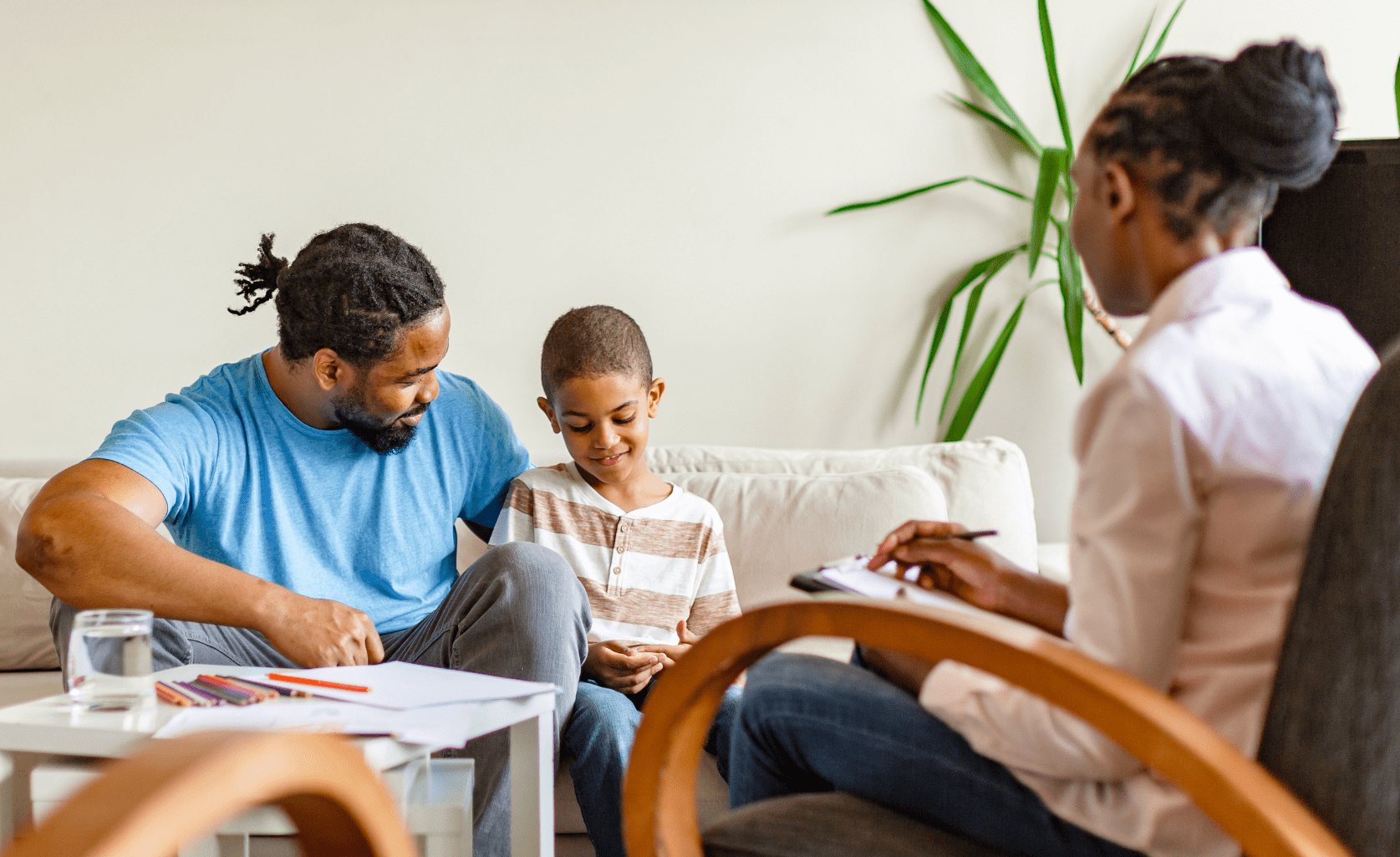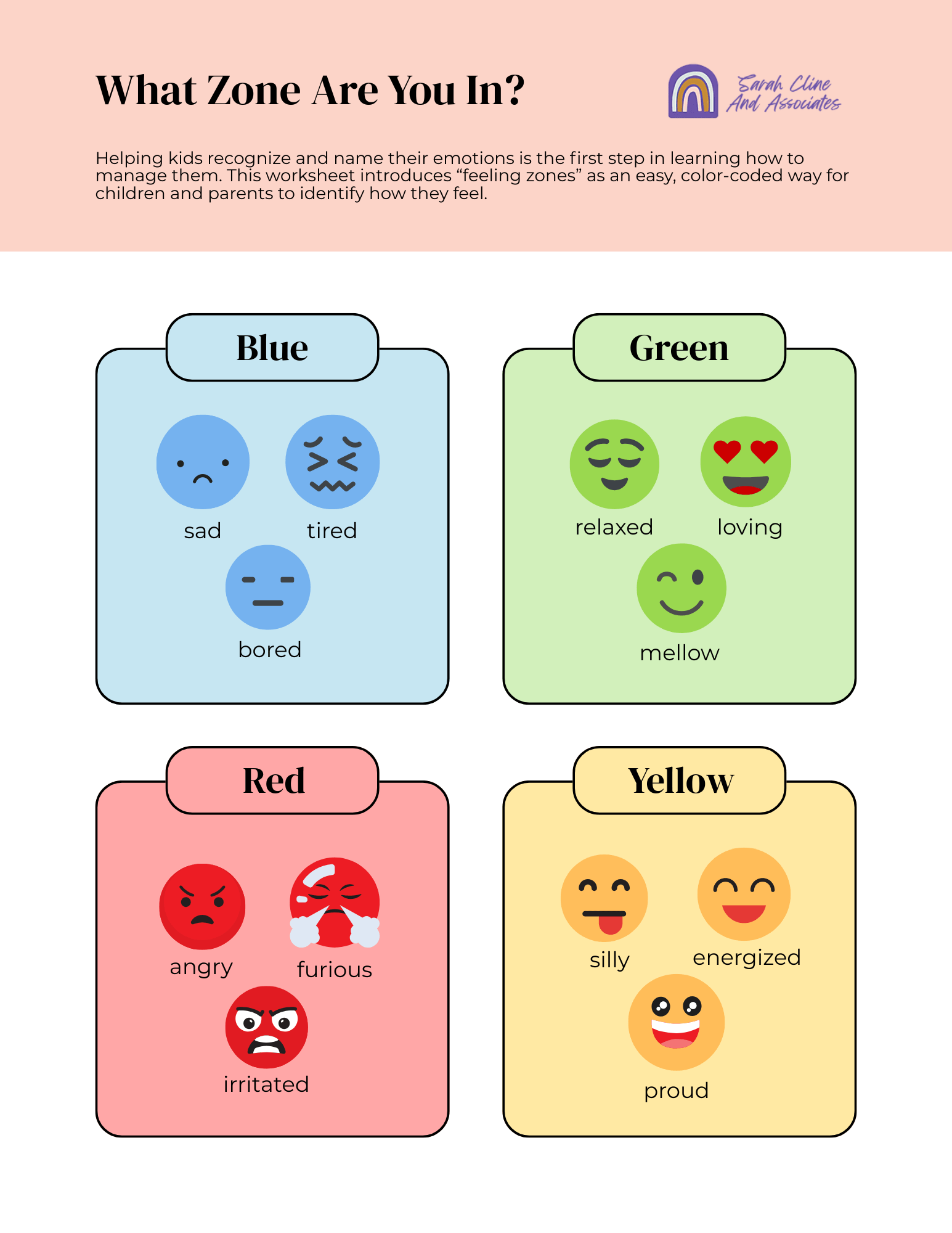Therapy for Kids & Teens
Therapy for kids and teens in Illinois for children ages 10 and up experiencing anxiety, depression, emotional regulation challenges, and life transitions. Evidence-based counseling helps young people build coping skills, confidence, and emotional resilience.
- For: Children & teens ages 10+
- Common concerns: Anxiety, depression, emotional outbursts, school stress, self-esteem, grief, life transitions
- Approaches: CBT, Solution-Focused Therapy, Person-Centered Therapy, Mindfulness, Internal Family Systems (IFS)
- Sessions: 55–60 minutes
- Format: In-person (Wheaton, IL) & virtual throughout Illinois
- Parent involvement: Included as clinically appropriate

At Sarah Cline & Associates, we understand that growing up comes with its own set of challenges.
Our warm and empathetic approach ensures that kids and teens always feel safe, welcomed, and understood. We work with children and teens (ages 10 and up) experiencing anxiety, depression, life transitions, loss, and self-esteem issues.
Our goal is to provide a supportive space where young people can express themselves freely and work through their struggles with confidence. counseling for kids
What is therapy for kids and teens?
Signs Your Child May Need Therapy
Frequent mood swings or intense emotional reactions
Withdrawal from friends, family, or activities they once enjoyed
Persistent worries, fears, or difficulty calming down
Declining performance or loss of interest in school
Changes in sleep, appetite, or daily routines
Trouble getting along with peers, siblings, or authority figures
Therapy for kids and teens is a supportive process that helps young people understand their emotions, manage stress, and develop healthy coping skills. Sessions are tailored to a child’s age, personality, and needs, using conversation, activities, and skill-building to help them feel safer and more confident.
The focus is on growth, not judgment. counseling for kids
Expert Support for Kids & Teens
Our Approach
We believe in guiding our young clients with compassion and without judgment.
Our therapists help kids and teens understand their feelings better and develop effective strategies to manage them.
We use various therapeutic techniques such as Cognitive Behavioral Therapy (CBT), Solution-Focused Therapy, Person-Centered Therapy, Mindfulness, and Internal Family Systems (IFS), always tailored to the client’s needs.
We focus on building a trusting relationship, where young clients feel comfortable and empowered to take the lead in their sessions. Whether it’s through talking, playing board games, or taking a walk, we provide a flexible approach that meets each child where they are. counseling for kids
How Therapy for Kids & Teens Works
Initial Consultation
We meet to understand your child’s needs and determine whether therapy is a good fit.
Assessment & Understanding
Early sessions focus on emotional patterns, stressors, and strengths.
Ongoing Therapy
Sessions build coping skills, emotional awareness, and confidence using age-appropriate approaches.
Integration & Practice
Skills are reinforced at home and school with gentle guidance.
Ongoing Support or Transition
Therapy continues as long as it’s helpful, with regular check-ins on progress and goals.
A Typical Session
During a 55-60 minute session, your therapist will provide a safe space for your child to express their feelings and concerns. We listen closely without judgment and offer gentle support and guidance.
Sessions may include:
- Checking in on how the past week has been
- Discussing current thoughts and feelings
- Using activities like board games, walks, or stories to facilitate conversation
- Teaching and practicing mindfulness and coping strategies
- Assigning “homework” to practice skills at home
Our compassionate counselors are here to support your child through their journey, helping them feel empowered and hopeful. At Sarah Cline & Associates, your child is not alone.
Together, we can navigate the challenges of growing up and work towards a brighter, more fulfilling future.
Age-Specific Approaches
Play Therapy
Through play, children express feelings and experiences in a safe, natural way that helps them process emotions and build coping skills.
Art Therapy
Creative expression through drawing, painting, or other art activities allows kids and teens to explore emotions they may not have words for yet.
Parent-Child Therapy
Sessions involving both parent and child strengthen communication, build trust, and create tools for healthier family interactions.

How does therapy help children with anxiety or big emotions?
Can therapy help with school or social challenges?
Parent Involvement in Sessions
In many cases, children’s therapy includes guidance for parents alongside the child’s sessions—whether that means learning new communication strategies, reinforcing coping skills at home, or simply offering consistent support. When parents are actively involved, children often feel more understood, secure, and empowered to grow.
Therapy helps kids and teens learn how their thoughts, feelings, and behaviors connect. With guidance, they build tools to manage worry, calm their bodies, express emotions, and handle challenges more effectively.
Over time, this can reduce emotional outbursts and improve confidence.
Yes. Therapy can support difficulties related to school stress, peer relationships, self-esteem, and transitions. Sessions may focus on communication skills, confidence-building, emotional regulation, and problem-solving.
Support often extends beyond symptoms to daily life functioning.
Free Feeling Zones Worksheet for Kids & Parents
Helping kids recognize and name their emotions is the first step in learning how to manage them. This worksheet introduces “feeling zones” as an easy, color-coded way for children (and parents alongside them) to identify whether they’re calm, worried, upset, or excited. By using zones, families can create a shared language for emotions—making it easier to talk about feelings, practice coping strategies, and support one another at home.

Frequently Asked Questions
Do parents attend sessions?
Parent involvement is often an important part of the process. While some sessions are just for your child, others may include you to strengthen communication, practice strategies together, or share updates. We’ll decide the right balance based on your child’s age, needs, and progress.
What’s the difference between counseling and therapy for kids?
The terms are often used interchangeably, but in general, counseling tends to focus on specific challenges—like school stress or friendship struggles—while therapy can go deeper, addressing underlying patterns, emotional development, or past experiences. Both provide a safe space for your child to express themselves, build coping skills, and feel supported.
Do parents attend therapy sessions?
Parent involvement is often part of the process. Some sessions are for the child alone, while others include parents to strengthen communication and support skill-building at home. The balance depends on age, needs, and goals.
What issues can therapy help kids and teens with?
Therapy can help with anxiety, depression, emotional regulation, behavioral concerns, self-esteem, grief, school stress, and life transitions. It also supports children who struggle to express emotions or feel overwhelmed.
Is telehealth therapy available for kids and teens?
Yes. We offer virtual therapy throughout Illinois. Telehealth can be a flexible option for families and is structured to remain engaging and supportive for children and teens.
Sources
National Institute of Mental Health (NIMH)
Therapy is a recommended treatment for anxiety and depressive disorders in children and adolescents.
https://www.nimh.nih.gov/health/topics/child-and-adolescent-mental-health
Feel Heard, Feel Safe, Feel Better - Contact Us

In-Person Sessions
2100 Manchester Rd. Suite 501-1
Wheaton, IL. 60187
Virtual Sessions
Throughout Illinois
